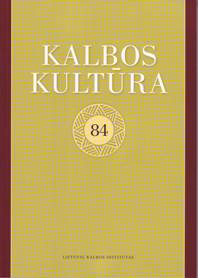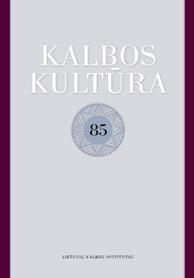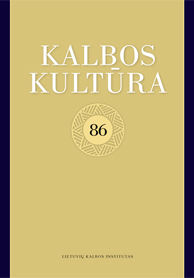
Jono Jablonskio pėdomis: linksnių klaidos ir taisymo motyvai
Starting with Jonas Jablonskis, the systematicity and attempts to strengthen the Lithuanian language norm have become more consistent. At the beginning of the 20th century the norm experienced a major impact of linguists working in the journal Gimtoji kalba, such as Skardžius, Salys, Jonikas, Talmantas, later—Balčikonis, Dambriūnas (Dambrauskas). Since the middle of the 20th century attempts to set the norm have become much less individualistic, more organised, contributors of the journal Gimtoji kalba were engaged in heated discussions on a number of topics relating to the theory of language culture as well as many of its practical issues, language use and norm setting in standardised language. Various newspapers and magazines started publishing articles dealing with practical language issues, including debatable topics. The articles focused on the research into grammatical cases and their usage, including errors, found in the actual language usage of the time.The present paper offers an overview of the first steps when the cases were started to be amended, attempts to amend the usage of the cases by linguists of the period between the two world wars, reasons for such amendments given by J. Jablonskis and linguists of the Gimtoji kalba, some later repercussions. The overview of early amendments of case usage can be summarised by pointing out that the reasons for such amendments were not always sufficiently detailed and well-grounded; in most cases reference was made to the impact of Russian, Polishand German. Some authors pointed out the impact of foreign languages as the key reason for all amendments, with no reference to the laws of language. An inclination to adopt the reasons from other authors is noticeable. The reasons supported by arguments are only given in the discussion section. In the course of discussion, some other, more vivid, reasons emerged; different opinions and new approaches to language were actively expressed. Jablonskis abstained from commenting and attempted to provide more examples, tried to save space and time. Very often the explication mainly included a sentence quoted from another author, which was given as an example of standard language. No discussion as to its well-formedness was found. In other words, the sentence by another author was the motivation to present it. In many cases the name of the author was mostly relied on. Often the same tradition of amending is noticeable in the works of several authors. Jablonskis must have relied on the data of the dialects, folklore, collections of songs and grammars. In all of his amendments Jablonskisattempted at language well-formedness, systematicity and consistency. His proposal to replace the nominative case by the partitive genitive (Genitivus partitivus) was among the most consistent. When amending, reference was mostly made to the data of the dialects, the language norms set by grammars; however, the context and tradition of usage were also important. The genitive case was among the most heatedly debated and most frequently amended cases, which must have been due to the whole-part relationship often expressed in Lithuanian by the genitive case. Numerous amendments of the dative case were the result of long-lasting discussion and a range of different opinions. The dative erroneously used to refer to an object was amended in the most consistent manner. The overview of all amendments of the accusative, comments and ideas suggested by different authors have led to a conclusion that the usage of the genitive case with the verbs of address was fluctuating. The data collected from different authors has led to a conclusion that the most frequent reason for amending the instrumental case is the impact of other languages (Russian, Polish, German). Jablonskis, in his discussion with some other authors, used the data of the dialects. Later linguists more often referred to the context, very seldom also to the laws of the Lithuanian language. When amending the locative, the linguist’s intuition seems to have been the least reliable; more arguments were provided. Despite that the usage was rather fluctuating, the amendments of the locative were largely stable.
More...

